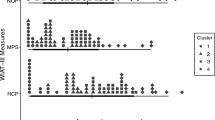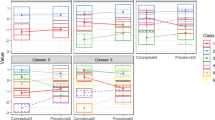Abstract
Prior research has shown that students from low socio-economic status (SES) families are at greater risk for mathematics education and achievement, and these factors in turn, may impact their long-term well-being. This paper investigates differences in mathematics achievement by SES, using clinical interview (CI). Students in Kindergarten to Grade 3 were studied using cross-sectional and longitudinal data to examine differences in mathematics accuracy, strategy use, and profiles. Results indicate minor differences in overall accuracy and in overall profile scores. At the subtest level, differences were found for accuracy for all grade levels. There were significant differences in mathematics performance by SES. In particular, larger differences by SES were found in mathematics accuracy than in sensible strategy use. For profile scores, significant differences were found by SES using cross sectional data; moreover, students’ profile scores differed by subtests and sections of the CI. Longitudinal data analysis indicated significant changes in students’ profile scores; however, there were no differences in profile scores by SES over time. Curricular and assessment implications are discussed, with directions for future research.
Similar content being viewed by others
References
Arias, C. A., Schorr, R. Y., & Warner, L. B. (2010). Using the clinical interview method to examine children’s mathematical thinking. Paper presented at the annual meeting of the American Educational Research Association, Denver, CO.
Caro, D. H. (2009). Socio-economic status and academic achievement tracjectories from childhood to adolescence. Canadian Journal of Education, 32(3), 558–590.
Clement, J. (2000). Analysis of clinical interviews: Foundations and model viability. In A. E. Kelly & R. A. Lesh (Eds.), Handbook of research design in mathematics and science education (pp. 547–589). Mahwah: Lawrence Erlbaum Associates, Publishers.
Denton, K., & West, J. (2002). Children’s reading and mathematics achievement in kindergarten and first grade. Washington, DC: National Center for Education Statistics.
diSessa, A. A. (2007). An interactional analysis of clinical interviewing. Cognition and Instruction, 25(4), 523–565.
Duncan, G. J., Dowsett, C. J., Claessens, A., Magnuson, K., Huston, A. C., Klebanov, P., & Japel, C. (2007). School readiness and later achievement. Developmental Psychology, 43(6), 1428–1446.
Geary, D. C., Hoard, M. K., Byrd-Craven, J., & DeSoto, M. C. (2004). Strategy choices in simple and complex addition: contributions of working memory and counting knowledge for children with mathematical disability. Experimental Child Psychology, 88, 121–151.
Ginsburg, H. P., & Pappas, S. (2004). SES, ethnic, and gender differences in young children’s informal addition and subtraction: a clinical interview investigation. Journal of Applied Developmental Psychology, 25, 171–192.
Ginsburg, H. P., Pappas, S., Lee, Y.-S., & Chiong, C. (2011). How did you get that answer? Computer assessments of young children’s mathematical minds in mCLASS math. In P. E. Noyce & D. T. Hickey (Eds.), New frontiers in formative assessment (pp. 49–67). Cambridge: Harvard Education Press.
Ginsburg, H. P., Pappas, S., & Seo, K.-H. (2001). Everyday mathematical knowledge: Asking young children what is developmentally appropriate. In S. L. Golbeck (Ed.), Psychological perspectives on early childhood education: Reframing dilemmas in research and practice (pp. 181–219). Mahwah: Lawrence Erlbaum Associates.
Ginsburg, H. P., & Russell, R. L. (1981). Social class and racial influences on early mathematical thinking. Monographs of the Society for Research in Child Development, 46(Serial No. 193, No. 6).
Graham, T. A., Nash, C., & Paul, K. (1997). Young children’s exposure to mathematics: the child care context. Early Childhood Education Journal, 25(1), 31–38.
Harwell, M., & LeBeau, B. (2010). Student eligibility for a free lunch as an SES measure in education research. Educational Researcher, 39(2), 120–131.
Harwell, M. R., Maeda, Y., & Lee, K. (2004). Replicating and extending Whites (1982) Meta-analysis of the relationship between SES and student achievement. Paper presented at the annual meeting of the American Educational Research Association, San Diego, CA.
Heckman, J. J. (2000). Policies to foster human capital. Research in Economics, 54(1), 3–56.
Hughes, M. (1986). Children and number: Difficulties in learning mathematics. Oxford: Basil Blackwell.
Hunting, R. P. (1997). Clinical interview methods in mathematics education research and practice. Journal of Mahtematical Behavior, 16(2), 145–165.
Hyson, M., & Woods, T. A. (2014). Practices, Knowledge and Beliefs about Professional Development. In H. P. Ginsburg, M. Hyson, & T. A. Woods (Eds.), Preparing Early Childhood Educators to Teach Math: Professional Development that Works (pp. 29–51). Baltimore: Brooks Publishing.
Jordan, N. C., Glutting, J., Ramineni, C., & Watkins, M. W. (2010). Validating a number sense screening tool for use in Kindergarten and First Grade: prediction of mathematics proficiency in Third Grade. School Psychology Review, 39(2), 181–195.
Jordan, N. C., Huttenlocher, J., & Levine, S. C. (1992). Differential calculation abilities in young children from middle- and low-income families. Developmental Psychology, 28, 644–653.
Jordan, N. C., Huttenlocher, L., & Levine, S. C. (1994). Assessing early arithmetic abilities: effects of verbal and nonverbal response types on the calculation performance of middle- and low-income children. Learning and Individual Differences, 6, 413–432.
Jordan, N. C., Kaplan, D., Locuniak, M. N., & Ramineni, C. (2007). Predicting first grade math achievement from developmental number sense trajectories. Learning Disabilities Research and Practice, 22(1), 36–46.
Jordan, N. C., Kaplan, D., Olah, L. N., & Locuniak, M. N. (2006). Number sense growth in Kindergarten: a longitudinal investigation of children at risk for mathematics difficulties. Child Development, 77(1), 153–175.
Jordan, N. C., Kaplan, D., Ramineni, C., & Locuniak, M. N. (2008). Development of number combination skill in the early school years: when do fingers help? Developmental science, 11(5), 662–668.
Kerkman, D. D., & Siegler, R. S. (1993). Individual differences and adaptive flexibility in lower-income children’s strategy choices. Learning and Individual Differences, 5(2), 113–136.
Kirk, G. E., Hunt, J. M., & Volkmar, F. (1975). Social class and preschool language skill: V. Cognitive and semantic mastery of number. Genetic Psychology Monographs, 93, 131–153.
Klein, J. S., & Bisanz, J. (2000). Preschoolers doing arithmetic: the concepts are willing but the working memory is weak. Canadian Journal of Experimental Psychology, 54(2), 105–115.
Klibanoff, R. S., Levine, S. C., Huttenlocher, J., Vasilyeva, M., & Hedges, L. V. (2006). Preschool children’s mathematical knowledge: the effect of teacher “math talk”. Developmental Psychology, 42(1), 59–69.
Kuhn, D. (2000). Metacognitive development. Current Directions in Psychological Science, 9(5), 178–181.
Ladson-Billings, G. (2006). From the achievement gap to the education debt: understanding achievement in U.S. Schools. Educational Researcher, 35(7), 3–12.
Lee, J. (2002). Racial and ethnic achievement gap trends: reversing the progress toward equity? Educational Researcher, 31(1), 3–12.
Lee, J.-S., & Bowen, N. K. (2006). Parent involvement, cultural capital, and the achievement gap among elementary school children. American Educational Research Journal, 43(2), 193–218.
Love, J. M., & Xue, Y. (2010). How early care and education programs 0-5 prepare children for Kindergarten: Is it enough? Paper presented at the Head Start’s 10th National Research Conference. DC: Washingon.
Lubienski, S. T., & Lubienski, C. (2006). School sector and academic achievement: a multilevel analysis of NAEP mathematics data. American Educational Research Journal, 43, 651–698.
Maher, C. A., & Sigley, R. (2014). Task-based interviews in mathematics education. In S. Lerman (Ed.), Encyclopedia of Mathematics Education (pp. 579–582). Netherlands: Springer.
Pappas, S., Ginsburg, H. P., & Jiang, M. (2003). SES differences in young children’s metacognition in the context of mathematical problem solving. Cognitive Development, 18(3), 431–450.
Saxe, G. B., Guberman, S. R., & Gearhart, M. (1987). Social processes in early number development. Monographs of the Society for Research in Child Development, 52(2, Serial No. 216).
Siegler, R. S. (1988). Individual differences in strategy choices: good students, not-so-good students, and perfectionists. Child Development, 59, 833–851.
Sirin, S. R. (2005). Socioeconomic status and academic achievement: a meta-analytic review of research. Review of Educational Research, 75, 417–453.
Starkey, P., & Klein, A. (1992). Economic and cultural influences on early mathematical development. In F. L. Parker, R. Robinson, S. Sombrano, C. Piotrowski, J. Hagen, S. Randolph, & A. Baker (Eds.), New directions in child and family research: Shaping Head Start in the 90s (pp. 440–443). New York: National Council of Jewish Women.
Author information
Authors and Affiliations
Corresponding author
Electronic supplementary material
Below is the link to the electronic supplementary material.
Rights and permissions
About this article
Cite this article
Lee, YS., Park, Y.S. & Ginsburg, H. Socio-economic status differences in mathematics accuracy, strategy use, and profiles in the early years of schooling. ZDM Mathematics Education 48, 1065–1078 (2016). https://doi.org/10.1007/s11858-016-0783-y
Accepted:
Published:
Issue Date:
DOI: https://doi.org/10.1007/s11858-016-0783-y




